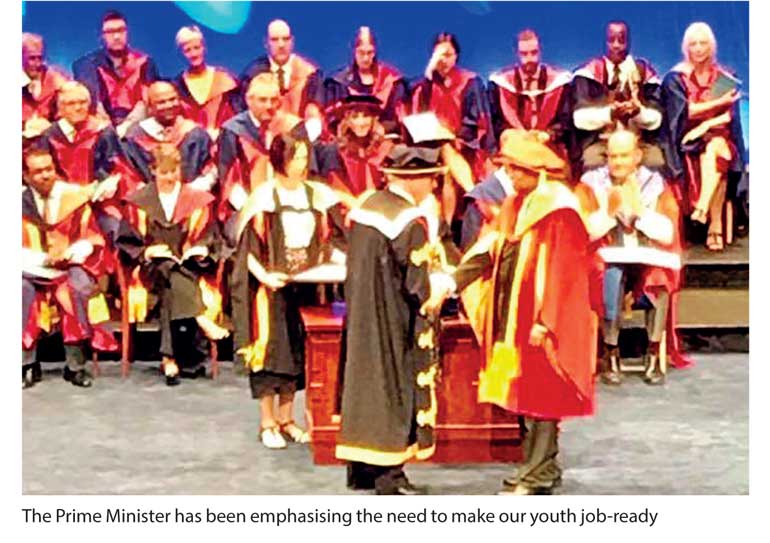A Brief Colonial History Of Ceylon(SriLanka)
Sri Lanka: One Island Two Nations
A Brief Colonial History Of Ceylon(SriLanka)
Sri Lanka: One Island Two Nations
(Full Story)
Search This Blog
Back to 500BC.
==========================
Thiranjala Weerasinghe sj.- One Island Two Nations
?????????????????????????????????????????????????Sunday, June 25, 2017
Education allocations must target youth unemployment
 Friday, 23 June 2017
Friday, 23 June 2017

There is now a commitment to increase the number of students entering universities by 2020 and also to allocate more funds for vocational training.
The current intake into government universities is around 25,000 per year. Nearly 60% (150,000) of the students who sit for the exam and satisfy the minimum requirement cannot enter universities. While this proposal is certainly a positive move, the challenge however will be to improve the teaching quality and curriculum of government universities.
To teach four times as many undergraduate students would require additional faculty and high-quality investments to build better infrastructure. If the pool is unchanged, curriculum not revised and facilities not modernised, the increased demand will result in lower quality faculty being hired and the education system will deliver poor quality graduates.
Faculty quality is the principal determinant of university quality. Therefore, the Government needs to create career opportunities to attract, develop and retain good academics. In a competitive world if a nation does not continually improve its system of higher education its relative performance will decline. In the medium term this is likely to show up as reduced economic competitiveness.
Sri Lanka’s public expenditure on education stands at around 2%, therefore by increasing this amount and disbursing it effectively the country can improve its labour productivity. However, simply increasing public spending on education will not serve any purpose if the country does not change its curriculum and style of teaching to suit a modern economy. Sri Lanka’s current labour productivity is low compared to many industrialised countries. For example, US labour is five times more productive. Research suggests that there is a direct positive relationship between the amount spent on education and the level of productivity. Total funding of higher education as a percentage of GDP is highest in the United States and Korea followed by Canada, Chile, Malaysia and Saudi Arabia.
 Therefore
there is little debate about the need to improve the quality of
university education in Sri Lanka. For years official data shows the
majority of the graduates in the Arts stream are unemployable. But we
continue to invest in those degree courses. Their career path is that of
conducting street protests and then getting absorbed into government
service.
Therefore
there is little debate about the need to improve the quality of
university education in Sri Lanka. For years official data shows the
majority of the graduates in the Arts stream are unemployable. But we
continue to invest in those degree courses. Their career path is that of
conducting street protests and then getting absorbed into government
service.
The key to improving labour market competitiveness in the economy lies in raising human resource capabilities, that is, to make appropriate investments in human capital through higher education and professional training in order to more efficiently generate and manage new technologies to create wealth.
In this new era of intensified globalisation and international competition, we can no longer rely on cheap labour to gain competitiveness. We must continue to invest in our human resources since the high growth industries of the future such as the information technology (IT) and biotechnology industries require an increasingly skilled labour force.
Lessons learned from other successful countries in attracting FDI indicate that the ability to create a skilled human resource base is crucial for multinational companies to relocate firms and world-class high-tech plants to new markets.
In Sri Lanka we are often told that the trained talent we have in the country is not sufficient to meet the local demand. The three main reasons for this emerging situation are:
a) The education system in the country is not delivering the volume and quality desired
b) We are losing our highly-trained talent to other developed markets
c) The existence of stringent labour market regulations limits training opportunities for young people to learn and grow new skills.
The areas of growth for the Lankan economy in the future according to Prime Minister Wickremesinghe will be in the services and knowledge sectors. Therefore given the current development of the BPO and tourism industry as well as skilled opportunities in foreign countries, there is now a need to revamp our education and training infrastructure according to the job market and lure back some of our brightest people to strengthen our talent pool.
The Government’s move to offer dual citizenship is a good start, however other benefits are required in the 2017 budget proposals to entice back some of our top Sri Lankan expatriates who have gone abroad to make their money but still feel the tug of their home country to return. Therefore we need to be more imaginative about attracting our trained talent abroad and developing and retaining the skilled talent that we have in Sri Lanka.
To achieve that we need a framework to strengthen overall governance in the country, a framework that provides a way of looking at the skills and abilities of our people, and how these skills can be used successfully to create wealth for our country.
(The writer is a thought leader in HR).
 Friday, 23 June 2017
Friday, 23 June 2017
There is now a commitment to increase the number of students entering universities by 2020 and also to allocate more funds for vocational training.
The current intake into government universities is around 25,000 per year. Nearly 60% (150,000) of the students who sit for the exam and satisfy the minimum requirement cannot enter universities. While this proposal is certainly a positive move, the challenge however will be to improve the teaching quality and curriculum of government universities.
To teach four times as many undergraduate students would require additional faculty and high-quality investments to build better infrastructure. If the pool is unchanged, curriculum not revised and facilities not modernised, the increased demand will result in lower quality faculty being hired and the education system will deliver poor quality graduates.
Faculty quality is the principal determinant of university quality. Therefore, the Government needs to create career opportunities to attract, develop and retain good academics. In a competitive world if a nation does not continually improve its system of higher education its relative performance will decline. In the medium term this is likely to show up as reduced economic competitiveness.
Sri Lanka’s public expenditure on education stands at around 2%, therefore by increasing this amount and disbursing it effectively the country can improve its labour productivity. However, simply increasing public spending on education will not serve any purpose if the country does not change its curriculum and style of teaching to suit a modern economy. Sri Lanka’s current labour productivity is low compared to many industrialised countries. For example, US labour is five times more productive. Research suggests that there is a direct positive relationship between the amount spent on education and the level of productivity. Total funding of higher education as a percentage of GDP is highest in the United States and Korea followed by Canada, Chile, Malaysia and Saudi Arabia.
Competitiveness
 Therefore
there is little debate about the need to improve the quality of
university education in Sri Lanka. For years official data shows the
majority of the graduates in the Arts stream are unemployable. But we
continue to invest in those degree courses. Their career path is that of
conducting street protests and then getting absorbed into government
service.
Therefore
there is little debate about the need to improve the quality of
university education in Sri Lanka. For years official data shows the
majority of the graduates in the Arts stream are unemployable. But we
continue to invest in those degree courses. Their career path is that of
conducting street protests and then getting absorbed into government
service.The key to improving labour market competitiveness in the economy lies in raising human resource capabilities, that is, to make appropriate investments in human capital through higher education and professional training in order to more efficiently generate and manage new technologies to create wealth.
In this new era of intensified globalisation and international competition, we can no longer rely on cheap labour to gain competitiveness. We must continue to invest in our human resources since the high growth industries of the future such as the information technology (IT) and biotechnology industries require an increasingly skilled labour force.
Lessons learned from other successful countries in attracting FDI indicate that the ability to create a skilled human resource base is crucial for multinational companies to relocate firms and world-class high-tech plants to new markets.
In Sri Lanka we are often told that the trained talent we have in the country is not sufficient to meet the local demand. The three main reasons for this emerging situation are:
a) The education system in the country is not delivering the volume and quality desired
b) We are losing our highly-trained talent to other developed markets
c) The existence of stringent labour market regulations limits training opportunities for young people to learn and grow new skills.
The areas of growth for the Lankan economy in the future according to Prime Minister Wickremesinghe will be in the services and knowledge sectors. Therefore given the current development of the BPO and tourism industry as well as skilled opportunities in foreign countries, there is now a need to revamp our education and training infrastructure according to the job market and lure back some of our brightest people to strengthen our talent pool.
Budget 2017
Today the most mobile people are those who are skilled, and they are sought after. Most governments are easing restrictions on the entry of qualified people. For a start the Government should focus on wooing our highly skilled professionals working abroad by making it very attractive for them to come back.The Government’s move to offer dual citizenship is a good start, however other benefits are required in the 2017 budget proposals to entice back some of our top Sri Lankan expatriates who have gone abroad to make their money but still feel the tug of their home country to return. Therefore we need to be more imaginative about attracting our trained talent abroad and developing and retaining the skilled talent that we have in Sri Lanka.
To achieve that we need a framework to strengthen overall governance in the country, a framework that provides a way of looking at the skills and abilities of our people, and how these skills can be used successfully to create wealth for our country.
(The writer is a thought leader in HR).

